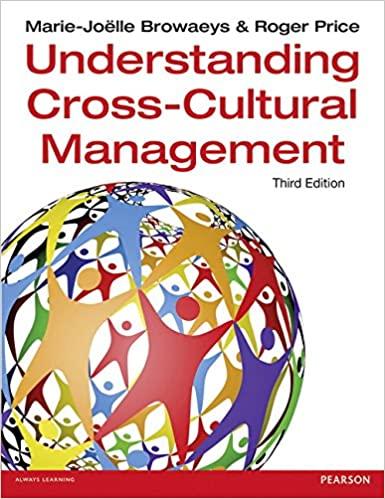During a visit to Japan, when the market was particularly bad, I was privileged to be witness
Question:
During a visit to Japan, when the market was particularly bad, I was privileged to be witness to a peculiar incident that can only be explained in terms of cultural differences. The Japanese have a deserved reputation for being very tough negotiators. Our opposition on the occasion seemed to relish their position of strength and pummelled our suggested price down to a very low level indeed. The negotiations carried on for approximately an hour, when the Japanese gave us an ultimatum of either accepting their price or cancelling the deal.
My boss, a grey-haired British individual well-known and respected in the industry, is normally extremely polite when it comes to Japanese customers. The frustration of having a weak negotiating position, coupled with the pressure he felt at having to sell at a price that was hardly profitable, led to an uncharacteristic outburst. For a good fifteen minutes he harangued the Japanese team about their hypocrisy of criticising white South Africans for exploiting blacks, while at the same time buying at prices that would lead to mine closures and the retrenchment of thousands of black workers. It was apparent from his demeanour that my boss was prepared to lose the customer rather than compromise on price.
After he had concluded his monologue, a stunned silence followed. Our agent was aghast at the rudeness displayed and started to apologise in Japanese. He was abruptly cut short by a few curt words from the Japanese lead negotiator.
The customer’s team engaged in a whispered consultation. After a short time they asked us and our agent to leave the room, and wait outside in the passage. There we were left to cool our heels for an uncomfortable 15 minutes, with our agent casting reproachful glances at my boss. At the end of the 15 minutes, we were summoned back into the room.
The Japanese team had recovered their composure, and regarded us with perfect inscrutability. Their chief negotiator, in a significant departure from protocol, dispensed with the traditional translator and addressed us in fluent English: ‘Johnson, we appreciate your frankness in explaining the situation in South Africa to us for our better understanding. We have very seriously considered what you have said. We have therefore decided not to accept your offer.’
At this point, we felt the tension really growing. We were after all going to lose this customer. Then the Japanese negotiator continued: ‘We will however make you another offer. We have decided to offer you an additional fifty cents pertonne above the price that you originally asked for.’
This took a few moments to sink in. After insulting the Japanese, we were going to receive even more than we asked for. We accepted the offer with alacrity and good grace and returned to our hotel to celebrate and marvel at the strange course of events that had unfolded.
Questions
1. Why did the Japanese offer a higher price than originally required?
2. What is the conflict-handling style chosen by each party? Give evidence from the case to support your answer.
3. Extract from the text those moments when emotions (do not) appear. Which are typically Japanese or British? Can you explain why?
Step by Step Answer:

Understanding Cross Cultural Management
ISBN: 9781292015897
3rd Edition
Authors: Marie Joelle Browaeys, Roger Price





